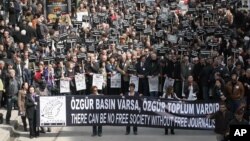PARIS —
Many Western European countries scored near the top of a newly released press freedom report card by Paris-based Reporters Sans Frontieres (Reporters Without Borders). But overall the region is more checkered, with countries like Russia and Turkey placing near the bottom.
European Union member Finland tops Reporters Sans Frontieres' latest press freedom index. Eight other European countries also rank among the top ten in the world in terms of media liberty.
But RSF's overall rating for the EU is far from perfect. Out of 179 countries, Italy ranks a disappointing 57th place, while Hungary, which has introduced restrictive media laws, comes in 56th. Greece's rates even lower - in 84th place.
Johann Bihr, head of RSF's Europe and Central Asian Desk, said there's a lesson here for the 27-member European Union.
"The European Union still has much to do to tackle the threats on democratic values inside the European Union," he said. "If it really wants to have a significant power on the Balkans, on Turkey, on Russia, if it really wants to give lessons to its neighbors, then the European Union should work really hard to be exemplary. Which is absolutely not the case."
In Italy, Bihr said, investigative journalists are on mafia hit lists. In Greece, they are also targeted in protests and feeling the heat of the country's economic meltdown: some journalist there are working without salaries.
Even some northern EU countries are far from exemplary. France, where RSF is based, ranks an unimpressive 37th on the scorecard, because of media policies imposed by the previous government, and because of restrictions by the military on journalists covering France's intervention in Mali this year.
"It really was a war without images. It was a war where in France, we could only get to know what happened here through the official communiques and military announcements, which is quite disquieting," said Bihr.
The picture is even grimmer for some of the countries outside the EU. Russia is ranked in 148th place -- near the bottom of the 2013 press freedom index.
Still, Bihr said the situation isn't completely bleak.
"The unprecedented mobilization of the opposition and civil society has opened the space both in the Internet and in the media, where we can see even journalists are gaining confidence and openly discussing political issues, criticizing the Kremlin," he said.
But he said that mobilization has been followed by repressive government measures, and new legislation criminalizing some Internet sites.
Turkey is ranked even lower - in 154th place.
"The situation is very serious as far as freedom of expression is concerned there, but at the same time, it's very dynamic," said Bihr. "It's the biggest jail for journalists in the world, with at least 70 journalists in jail, including 33 jailed for journalistic activities, which is obviously very shameful for a country which poses as a democratic model in the Middle East."
Bihr also linked any improvements in Turkey's ranking to strides in negotiations with Kurdish rebels, along with a series of legal reforms, such as amendments to Turkey's anti-terrorism law that protect and respect journalists.
European Union member Finland tops Reporters Sans Frontieres' latest press freedom index. Eight other European countries also rank among the top ten in the world in terms of media liberty.
But RSF's overall rating for the EU is far from perfect. Out of 179 countries, Italy ranks a disappointing 57th place, while Hungary, which has introduced restrictive media laws, comes in 56th. Greece's rates even lower - in 84th place.
Johann Bihr, head of RSF's Europe and Central Asian Desk, said there's a lesson here for the 27-member European Union.
"The European Union still has much to do to tackle the threats on democratic values inside the European Union," he said. "If it really wants to have a significant power on the Balkans, on Turkey, on Russia, if it really wants to give lessons to its neighbors, then the European Union should work really hard to be exemplary. Which is absolutely not the case."
In Italy, Bihr said, investigative journalists are on mafia hit lists. In Greece, they are also targeted in protests and feeling the heat of the country's economic meltdown: some journalist there are working without salaries.
Even some northern EU countries are far from exemplary. France, where RSF is based, ranks an unimpressive 37th on the scorecard, because of media policies imposed by the previous government, and because of restrictions by the military on journalists covering France's intervention in Mali this year.
"It really was a war without images. It was a war where in France, we could only get to know what happened here through the official communiques and military announcements, which is quite disquieting," said Bihr.
The picture is even grimmer for some of the countries outside the EU. Russia is ranked in 148th place -- near the bottom of the 2013 press freedom index.
Still, Bihr said the situation isn't completely bleak.
"The unprecedented mobilization of the opposition and civil society has opened the space both in the Internet and in the media, where we can see even journalists are gaining confidence and openly discussing political issues, criticizing the Kremlin," he said.
But he said that mobilization has been followed by repressive government measures, and new legislation criminalizing some Internet sites.
Turkey is ranked even lower - in 154th place.
"The situation is very serious as far as freedom of expression is concerned there, but at the same time, it's very dynamic," said Bihr. "It's the biggest jail for journalists in the world, with at least 70 journalists in jail, including 33 jailed for journalistic activities, which is obviously very shameful for a country which poses as a democratic model in the Middle East."
Bihr also linked any improvements in Turkey's ranking to strides in negotiations with Kurdish rebels, along with a series of legal reforms, such as amendments to Turkey's anti-terrorism law that protect and respect journalists.









